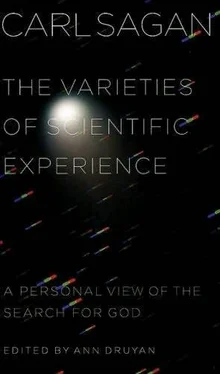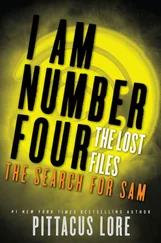I therefore conclude that the alleged natural theological arguments for the existence of God, the sort we're talking about, simply are not very compelling. They are trotting after the emotions, hoping to keep up. But they do not provide any satisfactory argument on their own. And yet it is perfectly possible to imagine that God, not an omnipotent or an omniscient god, just a reasonably competent god, could have made absolutely clear-cut evidence of His existence. Let me give a few examples.
Imagine that there is a set of holy books in all cultures in which there are a few enigmatic phrases that God or the gods tell our ancestors are to be passed on to the future with no change. Very important to get it exactly right. Now, so far that's not very different from the actual circumstances of alleged holy books. But suppose that the phrases in question were phrases that we would recognize today that could not have been recognized then. Simple example: The Sun is a star. Now, nobody knew that, let's say, in the sixth century B.C., when the Jews were in the Babylonian exile and picked up the Babylonian cosmology from the principal astronomers of the time. Ancient Babylonian science is the cosmology that is still enshrined in the book of Genesis. Suppose instead the story was "Don't forget, the Sun is a star." Or "Don't forget, Mars is a rusty place with volcanoes. Mars, you know, that red star? That's a world. It has volcanoes, it's rusty, there are clouds, there used to be rivers. There aren't anymore. You'll understand this later. Trust me. Right now, don't forget."
Or, "A body in motion tends to remain in motion. Don't think that bodies have to be moved to keep going. It's just the opposite, really. So later on you'll understand that if you didn't have friction, a moving object would just keep moving." Now, we can imagine the patriarchs scratching their heads in bewilderment, but after all it's God telling them. So they would copy it down dutifully, and this would be one of the many mysteries in holy books that would then go on to the future until we could recognize the truth, realize that no one back then could possibly have figured it out, and therefore deduce the existence of God.
There are many cases that you can imagine like this. How about "Thou shalt not travel faster than light"? Okay, you might argue that nobody was at imminent risk of breaking that commandment. It would have been a curiosity: "We don't understand what that one's about, but all the others we abide by." Or "There are no privileged frames of reference." Or how about some equations? Maxwell's laws in Egyptian hieroglyphics or ancient Chinese characters or ancient Hebrew. And all the terms are defined: "This is the electric field, this is the magnetic field." We don't know what those are, but we'll just copy them down, and then later, sure enough, it's Maxwell's laws or the Schrodinger equation. Anything like that would have been possible had God existed and had God wanted us to have evidence of His existence. Or in biology. How about, "Two strands entwined is the secret of life"? You may say that the Greeks were onto that because of the caduceus. You know, in the American army all the physicians wore the caduceus on their lapels, and various medical insurance schemes also use it. And it is connected with, if not the existence of life, at least saving it. But there are very few people who use this to say that the correct religion is the religion of the ancient Greeks, because they had the one symbol that survives critical scrutiny later on.
This business of proofs of God, had God wished to give us some, need not be restricted to this somewhat questionable method of making enigmatic statements to ancient sages and hoping they would survive. God could have engraved the Ten Commandments on the Moon. Large. Ten kilometers across per commandment. And nobody could see it from the Earth but then one day large telescopes would be invented or spacecraft would approach the Moon, and there it would be, engraved on the lunar surface. People would say, "How could that have gotten there?" And then there would be various hypotheses, most of which would be extremely interesting.
Or why not a hundred-kilometer crucifix in Earth orbit? God could certainly do that. Right? Certainly, create the universe? A simple thing like putting a crucifix in Earth orbit? Perfectly possible. Why didn't God do things of that sort? Or, put another way, why should God be so clear in the Bible and so obscure in the world?
I think this is a serious issue. If we believe, as most of the great theologians hold, that religious truth occurs only when there is a convergence between our knowledge of the natural world and revelation, why is it that this convergence is so feeble when it could easily have been so robust?
So, to conclude, I would like to quote from Protagoras in the fifth century B.C., the opening lines of his Essay on the Gods:
About the gods I have no means of knowing either that they exist or that they do not exist or what they are to look at. Many things prevent my knowing. Among others, the fact that they are never seen.
THE RELIGIOUS EXPERIENCE
Cast your mind back some hundreds of thousands of years. Those who can do that readily will have demonstrated some of the issues that I considered dubious earlier, but apart from reincarnation let's try to think about what were the circumstances of the greater part of the tenure of the human species on Earth. That surely is relevant to any attempt to understand our present circumstances.
The human family is some millions of years old, the human species perhaps one million, with some uncertainty. For the greater part of that period by far, we did not have anything like present technology, present social organization, or present religions. And yet our emotional predispositions were powerfully set in those times. Whatever our feelings and thoughts and approaches to the world were then, they must have been selectively advantageous, because we have done rather well. On this planet we are certainly the dominant organism of some fair size. An argument could be made for beetles or bacteria at smaller scales as being the dominant organism on the planet, but at least on our scale we have done quite well.
Now, what were those characteristics, and how 'would we know what they are? Well, one way we can know is by examining the groups of hunter-gatherers that are still tenuously alive on the planet today. These are small groups of people whose way of life predates the invention of agriculture. The fact that we know them means they must have made some contact with our present global civilization-and that immediately implies that their way of life is in its last days. They are the essence of humans. They have been studied by dedicated anthropologists who have lived with them, learned their languages, been adopted into the group in those cases that permit outsiders to have such an experience, and we can learn something about them. They are by no means all the same. This is a large topic, called cultural anthropology. I do not pretend to be expert in it, but I have had the benefit of spending a fair amount of time with some of the anthropologists who have been at the forefront of studying some of these groups. And I think it's relevant to the task before us.
There are, as I say, different kinds of groups, including some that we might consider absolutely horrendous and some that we might consider astonishingly benign, and I'll try to give a sense of each.
For the latter let me say just a few words about the!Kung people in the Kalahari Desert in the Republic of Botswana. These are a people who now have been drafted into the army of apartheid South Africa, and their culture has been irrevocably abused. But up until some twenty years ago, they had been well studied. We know something about them.
Читать дальше










